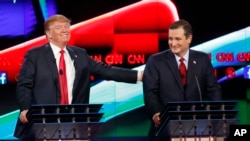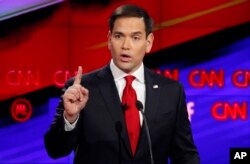The crowded field trying to become the Republican nominee in the 2016 U.S. presidential race emerged from their latest debate Tuesday night with the usual positive declarations about their performances, but only six weeks and one debate left to convince the first set of voters in Iowa.
Debate host CNN limited the main debate field based on poll numbers, but the event still featured nine candidates pressing their case to lead the country.
"There was this sense that we really do need to have fewer people on stage," said Lara Brown, program director at George Washington University's Graduate School of Political Management. She added there is a "top tier forming" that includes billionaire Donald Trump and Senators Ted Cruz and Marco Rubio.
Trump has largely led in national polls since July and the latest surveys show him with his highest support yet. Meanwhile, Cruz and Rubio have risen in recent weeks, just as neurosurgeon Ben Carson plummeted and everyone else remained polling only a few percentage points.
One of those low in the polls is former Florida governor Jeb Bush, who at several times during the debate focused on Trump, including telling the businessman, "You're not going to be able to insult your way to the presidency."
Brown said Bush appeared to accept he will not be the nominee and wanted to take down Trump for the sake of the party, but did not succeed.
"Because part of the problem around Trump is that for many of the people who support him, it doesn't matter what he says or what is said about him" she said. "They're supporting what he represents, and so the only thing that will change their view of Donald Trump is if he doesn't win."
Kathleen Hall Jamieson, a presidential debate historian and director of the Annenberg Public Policy Center at the University of Pennsylvania, said Bush performed better Tuesday night than he had in the previous four Republican debates.
"He seemed primed and ready to make the case that he is ready to be commander in chief, and by contrast that Donald Trump is not," she said.
The debate featured multiple instances of candidates interrupting each other and having extended back-and-forth conversations. One instance involved Rubio and Cruz discussing immigration policy and whether they would seek to deport illegal immigrants already living in the United States.
Jamieson said what matters is how those interactions are perceived by voters who are not members of a political party or have yet to decide who they are supporting in the race.
"[Cruz] is a competent debater, but in the exchanges with Marco Rubio, when they're both on stage and they're going back and forth about whose immigration policy does what and who is or isn't lying about the other person's positions on the issues, I think the public is simply confused," she said.
Brown said Cruz and Rubio overall had strong showings, fought for their positions and "landed criticisms of each other."
"For those who watch these debates, if your candidate is the one interrupting, you're happy because your candidate is fighting for more time," she said. "If it's not your candidate, you see it as intrusive."
The Republicans will debate again January 14, less than three weeks before the first nominating contest, the Iowa caucuses.
Those seeking the Democratic nomination have two debates remaining before Iowa, with their next one coming Saturday night.
Former Secretary of State Hillary Clinton, the long-standing front-runner among Democrats, used Twitter to try to set herself apart as the Republicans debated terrorism and national security issues.
"We need serious leadership to keep us safe. Hateful words and extreme proposals that go against our values aren't serious," she wrote. Clinton said the ideas from Republicans would not keep Americans safe, and that she was the only candidate who knows how to foster coalitions and "make the world safer."
Her chief competitor, Vermont Senator Bernie Sanders, also used the social media platform to promote a commitment to rights and to question why the Republicans did not cite income inequality, climate change or racial justice in their answers.
"We will not destroy ISIS by undermining our civil liberties and religious freedoms," Sanders said, using an acronym for the Islamic State group. He also said the idea of pushing away refugees fleeing Syria and Afghanistan is "reckless."













